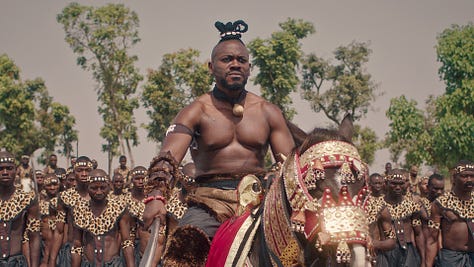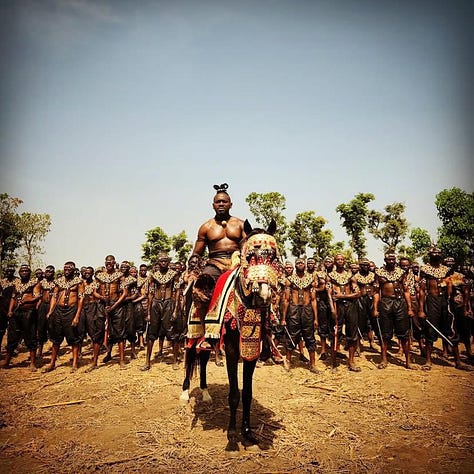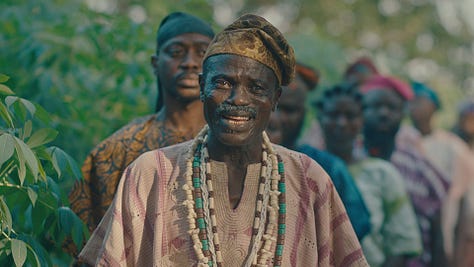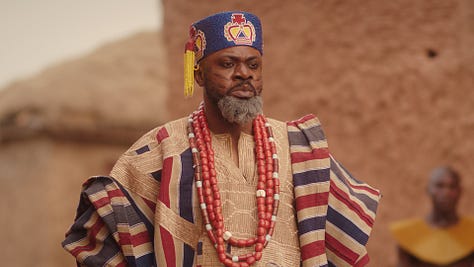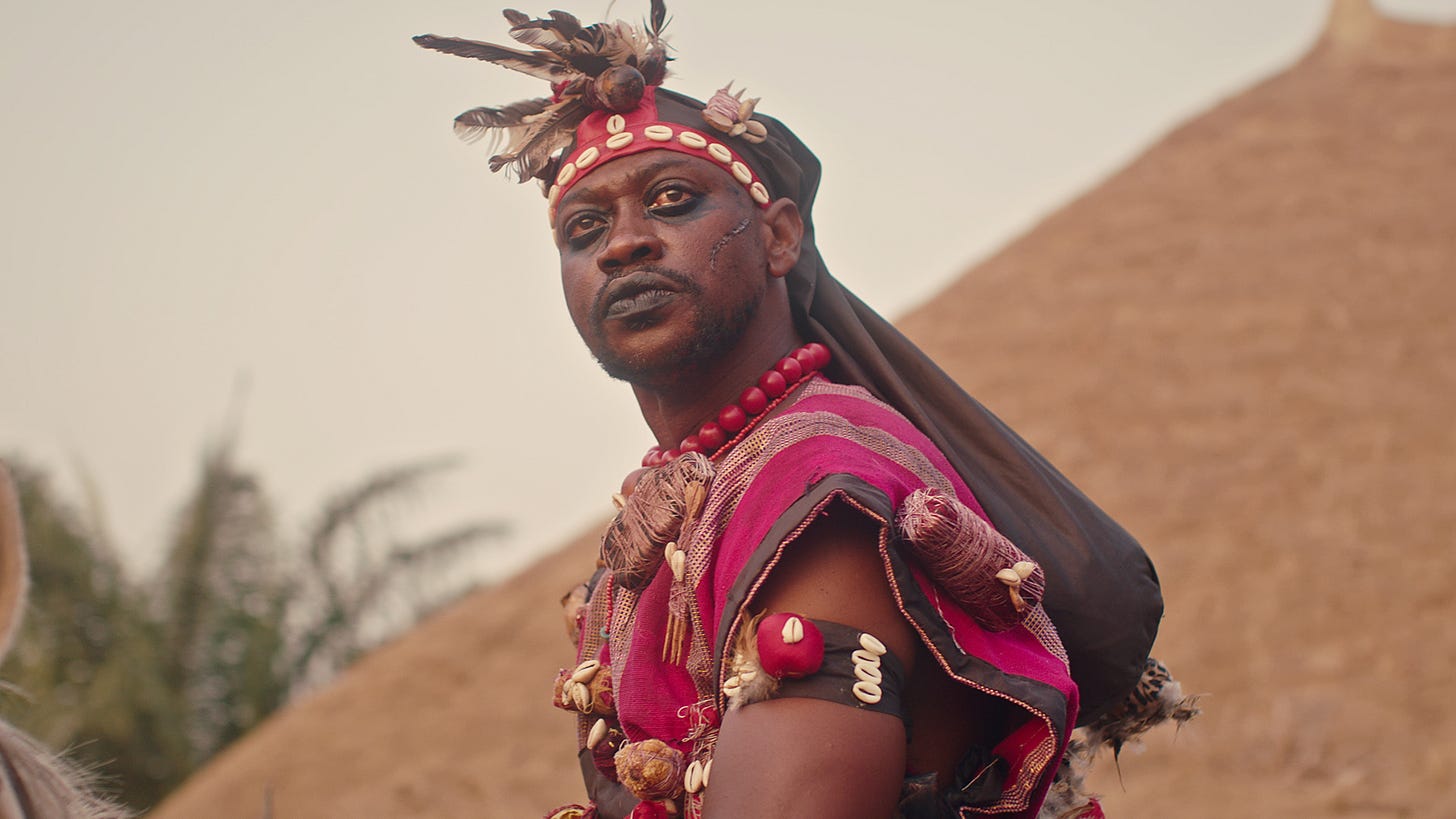"Lísàbí: A Legend is Born" Fails to Pay Off The Uprising it Started
A bloated tale of ambition and missed opportunities that fails to live up to its predecessor.
Read our review of the first movie “Lísàbí: The Uprising” HERE.
Epic tales have a unique power to captivate us, offering a blend of the extraordinary and the familiar—a world where towering heroes rise, fall, and leave legacies that resonate across time. These stories hold immense promise, especially when presented as sweeping sagas, weaving intricate narratives across generations and, like in this case, multiple movies. However, the grander the ambition, the more precarious the execution risks becoming. Rising stakes across movies can overwhelm both the story and the storyteller, and the temptation to pack ensuing moments with even more drama and spectacle can lead to a scattered, bloated result that feels more like a collection of ideas than a cohesive story. Lisabi: A Legend is Born, the sequel to Lisabi: The Uprising, aimed to expand the epic journey of the revered Egba leader, but in attempting to match the grandeur of its predecessor, the film gets lost in its own ambition, leaving us with an experience that is more disjointed than legendary.
From the very beginning, it’s clear that something is off. The first 20 minutes are spent rehashing the final moments of the first film—a curious choice that feels redundant at best and indulgent at worst. For those who’ve seen the original story, which hit Netflix just four months ago, this extended recap adds little value and detracts from the momentum the sequel desperately needs to establish. Instead of building on the emotional weight of the first film, this decision sets a tone of unnecessary padding that lingers throughout the movie.
The plot’s pacing doesn’t help matters. While we’re still grappling with the looming conflict between Egba and Oyo, Lisabi’s household overwhelms us with a heavy dose of exposition. Enter Ikeola (Bimpe Adedimeji)—one of the many characters we met in the first movie but in this one, she gets a little more to do by serving as an exposition vehicle for delivering backstory to the audience, especially around the circumstances surrounding Lisabi’s birth. In one scene, she talks about Lisabi’s possible betrayal by one of those closest to him, which while important, feels oddly placed. There’s a lot happening at once, but none of it feels gripping, and the film spirals without offering the emotional engagement we’d hoped for.
With a runtime of 1 hour and 30 minutes, Lisabi: A Legend is Born had enough space to build a well-rounded story, but it feels as though only 30% of the content is actually meaningful. The rest—an exhausting mix of redundant plot points, filler, and stretched-out moments—drags the film down. It’s hard not to compare it to the special section of “Netflix content” that seems to exist just for the sake of adding more content to the streamer’s library. It's another bloated attempt to milk a franchise, even if the story itself doesn’t demand it.
As the narrative continues, the pacing falters further. The build-up to the confrontation with Deyemi Okanlawon’s character promises to deliver the film’s climax, but the showdown ends too quickly, leaving an unsatisfying lull just as the story should gain momentum. This abrupt shift sets the stage for another time jump, where we find Lisabi as a more revered leader. However, this newfound status brings its own complications, with jealousy and betrayal festering within his camp. Bejide (Olumide Oworu), previously a background character, suddenly takes on a more prominent role, giving Lisabi the cold shoulder. Yet, this shift in behavior feels jarring, with no foreshadowing or context to explain his change. Like many elements in the film, it comes out of nowhere, leaving the audience to fill in the gaps.
The characters, particularly the rest of the men surrounding Lisabi, remain flat and underdeveloped. Aside from the familiar actors playing them, we barely get a sense of who they are as individuals. When Bejide turns on Lisabi, we’re expected to care, but with no emotional investment in the character, the betrayal feels hollow. In fact, much of the film struggles to give its characters the depth they deserve. Lisabi’s downfall, which could have been a powerful exploration of pride, leadership, and the consequences of neglecting those who helped you rise, is buried under incoherence and poor pacing. While there are glimpses of a deeper story about Lisabi’s hubris, it’s lost amid the chaos of the film’s uneven storytelling.
The lack of personality in the characters extends to the villains as well. I’d hoped for more screen time and a stronger portrayal of the Kabiyesi of Oyo as the big bad, perhaps even a darker side to his character that could have added real weight to the conflict. Unfortunately, his presence here is even more underwhelming than in the first movie, and what should have been a tense rivalry between two powerful forces never materializes.
Another point of contention is the film’s heavy use of anachronistic elements, which seem even more pronounced than in the first film. The fight choreography, while imaginative, feels more like a showcase of the director and choreographer’s personal fantasies than a grounded portrayal of historical warfare, but I’ll allow it. Artistic liberty is permissible. The sight of baby Lisabi in diapers, however, is a much harder one to forgive. How that made it to the final cut, I wonder. The fantastical elements, like the werewolves and the colorful bird, continue to feel out of place in a story about the Yoruba people. These two choices in particular lack a sense of cohesion with the world the film tries to establish. The visual effects, which attempt to bring these creatures to life, fall short, and the result is a confusing and visually cluttered experience.
Creative license can be a powerful tool, but only when it's grounded in strong world-building and a well-established narrative framework. Lisabi 2 takes bold creative liberties, yet it fails to construct a cohesive or immersive world to support them. The plot feels fragmented, with disjointed points that leave the story difficult to follow. The narrative demands more effort from the audience than it earns, offering little payoff for the confusion it creates.
On a positive note, the film’s colorful cinematography and use of costumes remain a highlight. They are eye-catching and continue to elevate the visual experience. It’s clear a lot of effort went into making the world look rich and authentic. The lesson about betrayal, a timeless and universal theme, is also present and could have been a strong through-line, but it gets lost in the shuffle of all the other chaotic plot points.
Musically, the film offers another silver lining. The scoring and soundtrack are beautiful, enhancing the atmosphere and helping immerse the audience in the world of Lisabi. While the music does its best to transport us into the story, it isn’t enough to save the film from its many flaws. As with many films, the success of the music, makeup, costumes, and source material isn’t enough to overcome the storytelling issues.
What should have been a stirring continuation of Lisabi's saga ultimately falls short, leaving us with a sequel that fumbles its promise of legend. I feel that Lisabi 1 & 2 could have been combined into a single, tighter film with a more focused narrative. By trimming the fat, improving pacing, and sharpening character development, this saga could have been stronger as a whole. Instead, what we’re left with is a bloated sequel that struggles to live up to its potential.
Written by: Niyi Akinmolayan and Yinka Olaoye
Directed by: Niyi Akinmolayan
Starring: Lateef Adedimeji, Odunlade Adekola, Bimpe Adedimeji, Gabriel Afolayan, Kelvin Ikeduba, Olumide Oworu, Bimbo Akintola, Deyemi Okanlawon, and many more.

